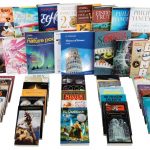While in the car at 4am yesterday morning--we were headed to watch the sunrise--my family got to chatting about Haiku. We even wrote one. Check out our early morning creation:
Good morning.
It is dark outside.
We're driving.
Since one of my nephews was in the car, I thought it was a good "teaching moment"--or, at least, an opportunity to show off <smile>--and so I explained how in English our poetry revolves around rhyme/meter, how Haiku revolves around specific syllable use, and how Hebrew poetry involves repetition of letters at the beginning of each line. For instance, English poetry repeats sounds:
| The sun is shining in the morn, | A |
| As if the world was new, just born. | A |
| We see the sky, all blue and clear. | B |
| The waves are close; they feel so near. | B |
But in Hebrew, the "AA.. BB..." scheme is literal:
| A | Again I see the silky sun |
| A | As it shines down on me. |
| B | Beneath the waves |
| B | Blue fish swim. |
My dad, who had been listening, suddenly remarked, "After all these years of studying English, I just learned something: Poetry is writing using specific constraints to make it artistic."
That was a much better explanation than what I got in Junior Year's Honors English: Poetry is whatever is not prose.
My dad went on to comment that using such a definition would make even the chiastic structure a form of poetry. And that makes sense, even if no one has officially labeled it so. And so, I'll label it officially:
The chiastic structure is a form of poetry.
In honor of today's ceremony, I would like to share a poem with you:
| Poetry is words | A |
| Which follow rules | B | And sometimes patterns. | C |
| The ciastic pattern | C |
| Uses rules | B |
| To make a poem. | A |
May you enjoy poetry, of all forms, today.
~Luke Holzmann
Filmmaker, Writer, Expectant Father








[…] other hidden sequences running up and down the page. And all of it is completely intentional, as poetry should […]
Jocelyn, I'm glad you found it informative. Thanks so much for stopping by!
Mideastmom, I wouldn't be surprised if it showed up in an LA IG... but my dad no longer has as much input into those as he once did <smile>.
~Luke
And when I see this definition in some future LA IG that I buy, I'll know where it came from. :-)
Hmm I never knew that about poetry (i did know what a hakiu was though). Very interesting, and thank you for sharing.